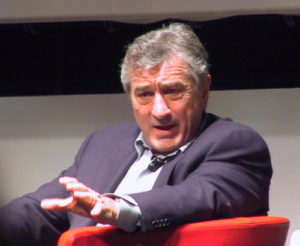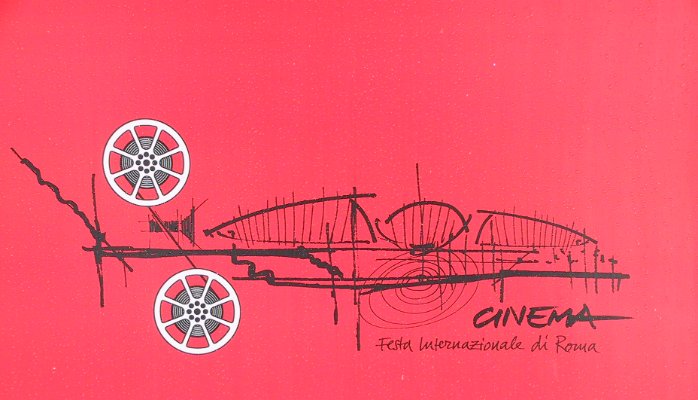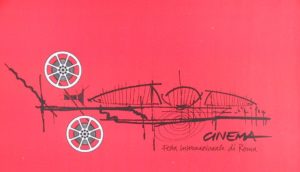
Reporting to you all this week from the press room at the Cinema Festa Internazionale di Roma running from Friday October 13 until Saturday October 21. I arrived last Thursday night and I’ll be presenting daily recaps and photos of the events I attended.
Preview: Thursday October 12, 2006
The Cinema Festa Internazionale di Roma 2006, or RomeFilmFest, is an extraordinary event that is about to happen. All of the elements are in place. They have the films, they have the right organizers, they have the appropriate facility, they have the international cinema interest and support, and they have the city of Rome. Unlike the conventional approach that other current premiere film festivals have taken of starting out as a small gathering of filmophiles and gradually increasing its popularity and status over several years, the RomeFilmFest officials are making an entrance into the international film festival scene with a big bang. With a history that involves a famous movie studio like Cinecittà which gave Rome the nickname of Hollywood on the Tiber, Rome knows that it should be a player.
There are 125 films that will be screened. Of these, 16 are competing films to which the people’s jury, presided by Ettore Scola and 50 viewers will award the best film, best actress, and best actor. The auditorium combined with movie theaters in and around Rome provides the festival with 36 screens. The event is well planned with making effective use of the city.
Senator Goffrado Bettini conceived the idea of this festival and is serving as its president. Since he was fourteen, he as organized cinema forums in Italy. A veteran politician, Bettini has also served as a deputy in the Italian Parliament. Since 1999, he has been the President of Musica per Roma, the foundation that runs the Auditorium Parco della Musica.
A factor that accelerated the idea of having a festival of this magnitude was the recent construction of the Auditorium Parco della Musica in northern Rome. This ultra modern facility with three large auditoriums, several smaller meeting rooms, and state of the art electronic support helped the organizers realize that they were equipped with a location that could handle an international event.
Bettini had no problem in finding support from a few important individuals. Rome’s Mayor Walter Veltroni got on board. Also much of the Italian cinema world of directors and actors showed enthusiasm for the event. Bettini was even able to get the attention across the Atlantic of Robert de Niro who started New York’s Chelsea Film Festival. These two events are working in coordination with each other.
There is no debate on the importance of Rome in international cinema history. To have an event celebrating cinema is a logical subsequence. In an environment where the competition between film festivals is beginning to cancel each other out, the festivals with the most relevance will be the ones most likely to survive and continue to attract the most sought after movies. The RomeFilmFest will make its first statement this week as to why it should be among the elite.
Day 1: Friday October 13, 2006
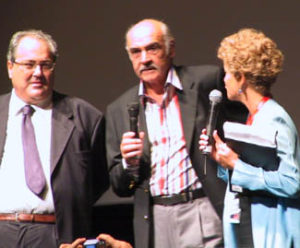 Arrived last night and I’m staying at a hotel two blocks away from the Auditorium Parco della Musica where the Cinema Festa Internazionale di Roma 2006 is being held. The hotel had a welcoming desk for the festival where I found a map of the Cinema Village layout. I walked over to the festival grounds to get a feel for the place. Everything was closed but I was at least able to find the press office entrance where I would need to pick up my press pass first thing this morning.
Arrived last night and I’m staying at a hotel two blocks away from the Auditorium Parco della Musica where the Cinema Festa Internazionale di Roma 2006 is being held. The hotel had a welcoming desk for the festival where I found a map of the Cinema Village layout. I walked over to the festival grounds to get a feel for the place. Everything was closed but I was at least able to find the press office entrance where I would need to pick up my press pass first thing this morning.
No problems with picking up my press pass at 9:00am when the office opened. Next I had to find the press room for journalists to work. The people in the office told me that room was next to Sala Sinolpoli, one of the main screening rooms at the auditorium.
Sean Connery is here to be awarded the Festa Del Cinema Acting Award 2006, which he received at Rome’s Teatro dell’Opera last night. This evening he inaugurated the red carpet to attend a viewing of the only movie he directed, The Bowler and the Bunnet, a documentary on the crisis at the Fairfield’s Shipyard on the Clyde in Scotland in the 1960s. Before the screening, Connery joked with the audience of journalists and fans, “This is a film I made in 1967 when I was 11-years old.” He also expressed how glad he was to attend the festival. “I am truly enthusiastic about being in Rome. It seems incredible that a large festival is being inaugurated only today in Rome.”
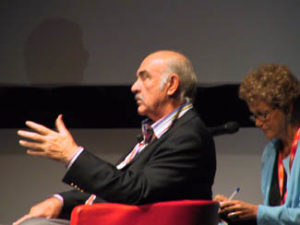 After the film, Connery was interviewed on stage by two of the festival’s organizers. They asked him to comment on why he has often played the role of a king in several of his movies. Connery quipped, “Well, because they never asked me to play a queen.” But then added, “I’ve always been comfortable with the roles whether they’ve been kings, warriors, or Robin Hood. The way you get comfortable with the part is you start with the feet and then work your way up.”
After the film, Connery was interviewed on stage by two of the festival’s organizers. They asked him to comment on why he has often played the role of a king in several of his movies. Connery quipped, “Well, because they never asked me to play a queen.” But then added, “I’ve always been comfortable with the roles whether they’ve been kings, warriors, or Robin Hood. The way you get comfortable with the part is you start with the feet and then work your way up.”
He was also asked to comment on working with directors such as Alfred Hitchock, John Huston, and Steven Spielberg. He said that one thing that was characteristic of all three was that they put a lot of detail into each of their sets that was the result of a lot of planning and preparation.
A few questions were fielded from the audience. One person asked if there was any truth to a fourth Indiana Jones movie being made. Connery explained that a script has yet to be presented to him. He was aware that a script had been written, but George Lucas was not happy with it. He added, however, that Lucas apparently still has a desire to make the film. “I saw Lucas and Spielberg in Los Angeles at the AFI awards. George said that he still wants to do the film, but no offer has yet been made to me. Perhaps by now they think that Harrison Ford is too old to be my son.”
When asked why he has stopped making films in Hollywood, he said, “Unfortunately, the gap in Hollywood grows increasingly larger between those who know how to make films and those who decide to give the green light on them.” Another person asked him to comment on his former bosses on the James Bond films. “Ian Fleming was a snob. How do you say ‘snob’ in Italian?” The audience answered, “Snob.” “Okay, Fleming was a snob. Terrence Young [the director of Dr. No, From Russia with Love, and Thunderball] was a gentleman. And Cubby Broccoli was a vegetable.”
Connery with one of the film festival’s translators:
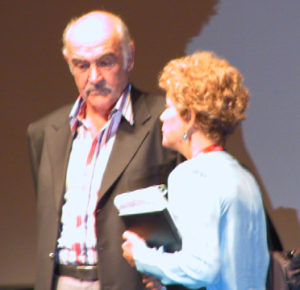
Connery with film festival president Goffredo Bettini & one of the festival’s translators:
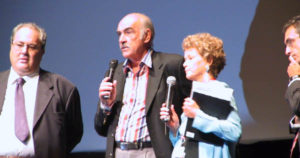
Film festival director Mario Sesti, NYU film school professor Antonio Monda, Sean Connery, and a festival translator:
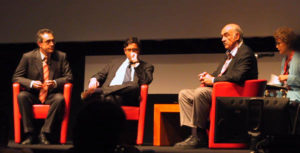
#####
Day 2: Saturday October 14, 2006
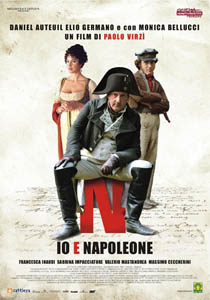 Today began with a press screening of the new Italian film, N: Io e Napoleone (N: Napoleon and Me), directed by Paolo Virzì and starring Daniel Auteuil, Elio Germano, and Monica Bellucci. Veteran writer Furio Scarpelli and Giacomo Scarpelli of Il Postino fame co-wrote the script with Virzì and Francesco Bruni. The film is a loose adaptation from the bestselling novel N by Ernesto Ferrero.
Today began with a press screening of the new Italian film, N: Io e Napoleone (N: Napoleon and Me), directed by Paolo Virzì and starring Daniel Auteuil, Elio Germano, and Monica Bellucci. Veteran writer Furio Scarpelli and Giacomo Scarpelli of Il Postino fame co-wrote the script with Virzì and Francesco Bruni. The film is a loose adaptation from the bestselling novel N by Ernesto Ferrero.
The story takes place when Napoleon Bonaparte (Daniel Auteuil) is exiled to the Island of Elba in 1814. While most of the locals enthusiastically welcome his arrival, one young man is not happy about it. Martino Papucci (Elio Germano), an idealistic school teacher, hates Napoleon for abandoning the revolutionary ideals by becoming a dictator and for sending so many youths to their deaths on the battlefield. Martino is so driven by his hate that he feels compelled to murder the new King of Elba. The opportunity presents itself when Martino is appointed as Napoleon’s clerk and librarian. The movie revolves around his struggle to commit this act as he gets to know the former emperor. The story also focuses on his relationships with his siblings, former teacher, and an older baroness played by Monica Bellucci. It’s an interesting story which mixes some intense moments with comical situations. With this movie, Virzì brings Italian cinema back to the period film, which surprisingly has not been done in Italy for a while.
After the film ended, the press conference began with Virzì, Bellucci, Germano, and other cast members in attendance. Unfortunately, Auteuil was unable to attend due to the recent death of his mother and the funeral was today.
There were several political questions about comparing Napoleon to current politicians in power, particularly, the former Italian prime minister Silvio Berlusconi. Virzì said that he was interested in pitting political hatred against human nature. He said that the theme that attracted him to making this film was the script’s clashing interaction between the disenchanted aging Napoleon and the naïve young libertarian. During the filming of the movie, Virzì told Germano to hate Napoleon as much as he hates Berlusconi. He believed that such instruction contributed to Germano’s performance. Germano interjected at that point that he has his own political ideas but they don’t include hate. After much discussion on the political relevancy of the film, one of the producers pointed out that it is not fair the just judge the film from a political point of view, even though it is a fun discussion for some journalists. He also pointed out that one of the film’s production companies is Medusa Film, which is owned by Berlusconi.
Most of the questions directed to Bellucci focused on her character in the film, the Baroness Emilia. She said that she enjoyed the chance to play such a childish and selfish character. She was also pleased to work with Virzì.
*****
In the late afternoon, members of the prestigious Actors Studio spoke to a small audience. The RomeFilmFest, in collaboration with the IMAIE (The Institute for the Protection of Performing Artists Rights), paid a tribute to the school by screening 13 films with Actors Studio members. The members present were distinguished actors Ellen Burnstyn and Martin Landau. The renowned actress and teacher, Elizabeth “Lili” Kemp was also part of the panel. Burnstyn and Landau spoke about the methods used at the Actors Studio and how the school, or rather workshop, had an influence on their lives. The purpose of this discussion was to inform aspiring actors and filmmakers in the audience what the Actors Studio method could do for them. They also wanted to promote the idea of organizing a similar type of program in Italy because of Italy’s cinema history. Later in the week Burnstyn and Landau, along with Lee Grant and Eli Wallach are scheduled to give another talk to a larger audience focusing on their careers and more about the Actors Studio.
Photos from the N: Io e Napoleone press meeting:
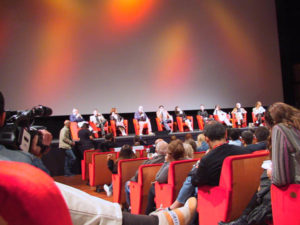
Actress Francesca Inaudi, director Paolo Virzi, and Antonio Monda:
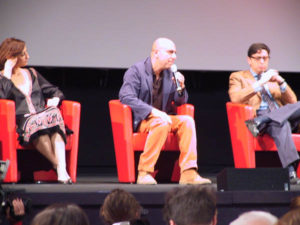
Antonio Monda, Monica Bellucci, and Elio Germano:
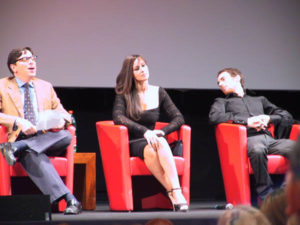
Monica Bellucci and Elio Germano:
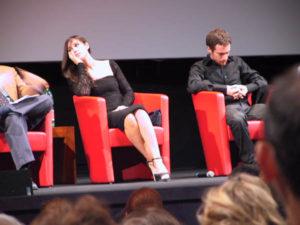
#####
Day 3: Sunday October 15, 2006
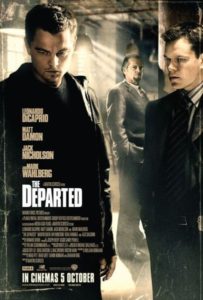 Today was Martin Scorsese Day. The day began with a press screening of his new film, The Departed followed by a press meeting with the director and a few other people involved with the production. In the afternoon, Scorsese met with the press and public to discuss his work on film preservation. He ended the day with a public screening of his new film.
Today was Martin Scorsese Day. The day began with a press screening of his new film, The Departed followed by a press meeting with the director and a few other people involved with the production. In the afternoon, Scorsese met with the press and public to discuss his work on film preservation. He ended the day with a public screening of his new film.
The story is based on the 2002 Hong Kong crime thriller called Internal Affairs. William Monahan wrote the screenplay for Scorsese’s version. The film focuses on the lives of two Boston cops played by Matt Damon and Leonardo DiCaprio who end up in a war to bring down an Irish mob boss played by Jack Nicholson. It’s an interesting story, but sometimes it lost the driving pace that is typical of Scorsese. Nicholson was good as always, but with his talent I thought he could have brought a much darker and searing approach to his character.
He certainly did some horrible things in the movie, but in his interactions with his crew or with the police, he just didn’t come off as dangerous as he was supposed to be. Damon and DiCaprio give solid performances. However, I couldn’t help thinking that although I like both Damon and DiCaprio, there are other actors I would like to have seen in these roles. I think the movie would have been much stronger with actors like Dominic West and Timothy Olyphant. The supporting cast of Martin Sheen, Alec Baldwin, Mark Wahlberg, Ray Winstone, and Vera Farmiga were all believable in their roles. However, Winstone’s part as Nicholson’s sidekick really didn’t give him enough to show what an excellent actor he is.
After the film ended, Scorsese, DiCaprio, and Farmiga came out to hold a press meeting. Most of the questions were directed to Scorsese. He stressed that the movie was experimental and he said that he was pleased that the studio allowed him to experiment with the material and take a risk. He was asked why he is turning away from Hollywood. He explained, “When there’s more money, there is less risk. I was lucky this time, but I’m finding that more difficult to continue.”
With this being the third film that he was done with DiCaprio, Scorsese was asked what he likes about working with the actor. He said that they have the same instincts. “I’m lucky because he’s re-inspired me. It’s different working with him than with De Niro who is my age.”
DiCaprio was asked what attracted him to do the film. He said that he liked the themes of betrayal and loyalty. He was also interested in the Irish fatalistic sense of humor.
Farmiga said that she was on cloud nine getting to work on a film with Scorsese, DiCaprio, and Damon. While she was considering whether to take the part she was offered, she showed the script to a psychiatrist in Los Angeles who said that Farmiga’s character of a psychiatrist in the script was doing everything wrong. “That’s what interested me in the role.”
When asked whether he enjoyed making a remake of a film, Scorsese said, “By the time I got to page 25 of the script, I was hooked into the world of this plot. I didn’t care that it was a remake.”
Finally, Scorsese was asked if he plans to film any more movies in Italy. “I would love to have another film in Italy. I’m always looking for that. But I don’t think my next one will since the film takes place in Japan.”
Photos from The Departed Press Meeting:
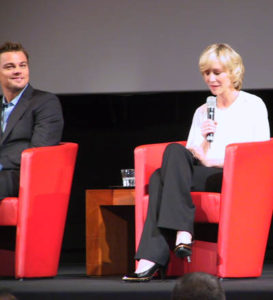
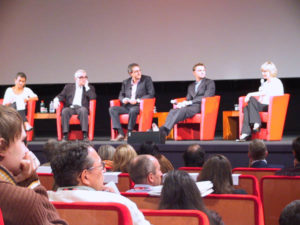
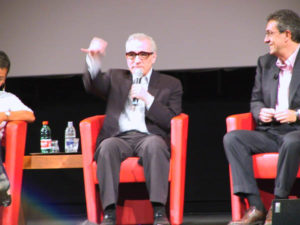
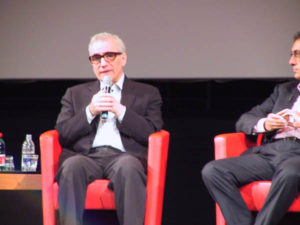
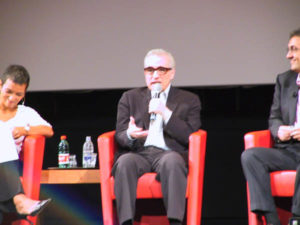
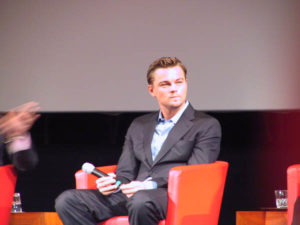
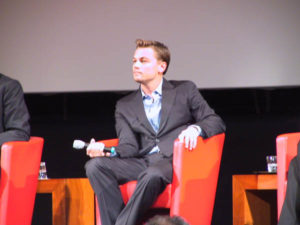
*****
In the afternoon, Scorsese met with an audience of press and public to discuss his efforts and his commitment to film preservation. The RomeFilmFest agreed to work with the Film Foundation on the restoration of movies which will subsequently be shown at the festival. This film festival is the first festival to invest in the restoration of major motion pictures. The nonprofit group was founded in 1990 by Scorsese and a distinguished group of filmmakers – Woody Allen, Robert Altman, Francis Ford Coppola, Clint Eastwood, Stanley Kubrick, George Lucas, Sydney Pollack, Robert Redford, and Steven Spielberg – all dedicated to protecting motion pictures and the rights of the artists who create them, educating the public about the importance of film preservation, and raising the necessary funds to save the endangered cinematic treasures of the 20th century. The Film Foundation tries to achieve these goals through innovative educational programs, national campaigns and public events.
Scorsese explained the reason for starting this organization. “So much money is being put into the industry, but no one thought about how to preserve it.” He went on to say that the Film Foundation was an effort that came out of anger and frustration of not being able to find copies of certain movies. “These things made us think about what the studios were doing with their libraries. Robert Rosen of UCLA told Scorsese that there needed to be a systematic restoration of their libraries.
Sony/Columbia Pictures was the first studio to restore their films. Since then, all of the major studios have implemented a restoration program. Paramount was the last to join due to a complex legal issue. The foundation function has been to bring together archivists and studios to work on key films for restoration. About sixteen films have been restored. Scorsese said that Hitchcock’s North by Northwest is the next film that needs to be restored. He also mentioned another film that needs to be restored soon which is close to the hearts of many Italians: Once Upon a Time in the West.
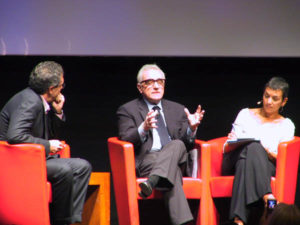
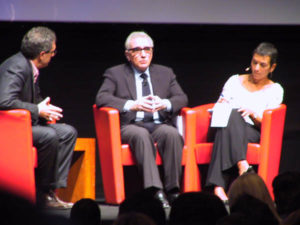
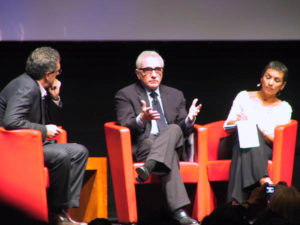
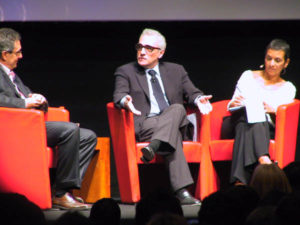
#####
Day 4: Monday October 16, 2006
Alatriste
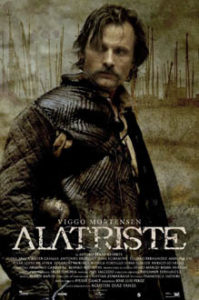 The day began with a press screening of Alatriste, a film based on the series of books Las Aventuras del Capitán Alatriste by Spanish author Arturo Pérez-Reverte about the adventures of a Spanish soldier living in the early 17th century. The director is Agustín Díaz Yanes who has been making his mark in the last ten years as one of Spain’s leading directors. In 1990, he was the assistant director to Pedro Almodovar for Atame! (Tie Me Up! Tie Me Down!) starring Antonio Banderas and Victoria Abril. His first feature film, Nadie Hablara de Nosotras Cuando Hayamos Muerto (Nobody Will Speak of Us When We’re Dead), in 1995. The film swept the Spanish Academy Awards that year. In 2001, he received praises for his film, Sin Noticias de Dios (Don’t Tempt Me), starring Victoria Abril and Penélope Cruz.
The day began with a press screening of Alatriste, a film based on the series of books Las Aventuras del Capitán Alatriste by Spanish author Arturo Pérez-Reverte about the adventures of a Spanish soldier living in the early 17th century. The director is Agustín Díaz Yanes who has been making his mark in the last ten years as one of Spain’s leading directors. In 1990, he was the assistant director to Pedro Almodovar for Atame! (Tie Me Up! Tie Me Down!) starring Antonio Banderas and Victoria Abril. His first feature film, Nadie Hablara de Nosotras Cuando Hayamos Muerto (Nobody Will Speak of Us When We’re Dead), in 1995. The film swept the Spanish Academy Awards that year. In 2001, he received praises for his film, Sin Noticias de Dios (Don’t Tempt Me), starring Victoria Abril and Penélope Cruz.
Viggo Mortensen stars in the title role and gives a strong performance as a daring soldier in battle and a precise sword for hire in peacetime. He is supported by a strong cast including Eduardo Noriega, Ariadna Gil, Javier Cámara, and Enrico Lo Verso.
The story is reminiscent of the Alexandre Dumas’ d’Artagnan adventures and focuses on the themes of honor, friendship, and duty. While an interesting story that keeps your attention, it seems to lack the momentum present in the Dumas classics. Also, while choreography of the sword fighting scenes certainly show a high level of skill, the action just doesn’t quite reach the level of intensity or excitement that was executed in Richard Lester’s The Three Musketeers (1973) and The Four Musketeers (1974).
After the screening, Yanes, Mortensen, Gil, Noreiga, and Lo Verso met with the press. It has been reported that this movie is the most expensive movie made in Spain to date (US $30 million) mainly due to it being a period picture. Yanes explained the challenges in making the film. “Alatriste was very difficult to make. Spain does not have much of a tradition of making period films like this, but we have very evocative landscapes.”
Mortensen responded to press questions in both Italian and English depending on the language of the journalist. There was much curiosity as to how he is able to speak both Italian and Spanish (he acts in Spanish in the entire film). “I grew up in Argentina where Italian culture is very deeply rooted which is why I speak Italian and Spanish well.”
A word about Italian actor Enrico Lo Verso. I was pleased to see that Lo Verso was attending the festival. He is one of Italy’s most versatile actors, yet hardly known at all in the U.S. He is very talented with an impressive range of roles to his credit. In all the films I’ve seen him in, his acting is always at a high level. A few years ago, I saw him on stage in Florence in an Italian production of A Streetcar Named Desire in which he gave a strong performance as Stanley Kowalski. He has another new movie that will be released soon and will be presented here on Friday. I will be sure to see that one as well. In regard to Alatriste, he remarked that he was very impressed by the detail in the costumes. He thought that everyone worked as though they were contributing to a monument. He briefly joked about the fencing scenes with Mortensen. He said that they were well rehearsed for these scenes, but he found it difficult at moments to attack at Mortensen who he considered a good friend and respected colleague.
Photos of the Alatriste press meeting:
Enrico Lo Verso, Eduardo Noreiga, Aiadna Gil, RomeFilmFest official Teresa Cavina, Augustin Diaz Yanez, and Viggo Mortensen:
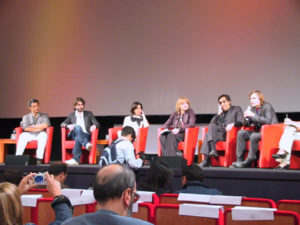
Agustin Diaz Yanes and Viggo Mortensen:
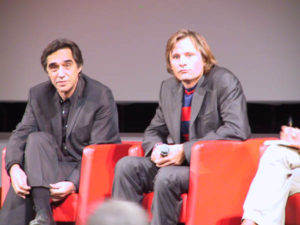
Viggo Mortensen:
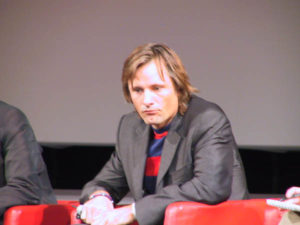
Enrico Lo Verso, Eduardo Noreiga, and Ariadna Gil:
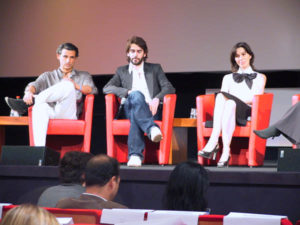
Enrico Lo Verso:
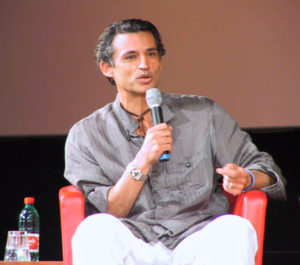
*****
The Namesake
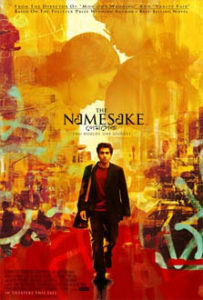 In the evening, I went to the only red carpet premiere that I planned to attend during the festival. And I only went to this premiere for one reason: Mira Nair, who has added another gem to her impressive repertoire of films that includes Vanity Fair, Monsoon Wedding, Mississippi Masala, and Salaam Bombay! She is here to present her latest film, The Namesake. Based on Jhumpa Lahiri’s best selling novel, the film is the story of a couple who move from Calcutta to New York, where their son Gogol is born. Gogol struggles with finding his identity within the two cultures that influence who he is. Often he finds himself in conflict with his parents’ traditional Indian values.
In the evening, I went to the only red carpet premiere that I planned to attend during the festival. And I only went to this premiere for one reason: Mira Nair, who has added another gem to her impressive repertoire of films that includes Vanity Fair, Monsoon Wedding, Mississippi Masala, and Salaam Bombay! She is here to present her latest film, The Namesake. Based on Jhumpa Lahiri’s best selling novel, the film is the story of a couple who move from Calcutta to New York, where their son Gogol is born. Gogol struggles with finding his identity within the two cultures that influence who he is. Often he finds himself in conflict with his parents’ traditional Indian values.
The movie stars Cal Pen, Tabu, and Irrfan Khan who all give effective performances. Nair’s longtime collaborator, Sooni Taraporevela, wrote the screenplay.
Nair, Taraporevela, and Tabu met with the press this morning. Nair explained what motivated her to make this movie. “I read Jhumpa Lahiri’s book on an airplane and had recently been to the funeral of a person that was very close to me.” She said that she identified with the story since she is from a small town outside of Calcutta and moved to New York when she was a student. She said that of all her films, this is movie is probably the most personal. Yet as she has achieved in so many of her films, she succeeds in crossing over specific cultures and making the story more universal.
Nair is currently in production on a feature-length documentary on the Beatles in India.
Photos of The Namesake press meeting:
Tabu, NYU film school professor Antonio Monda, Mira Nair, Sooni Taraporevala, and film festival translator:
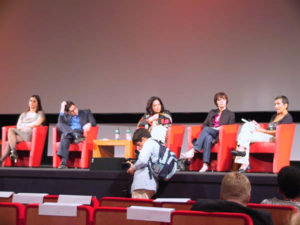
Mira Nair and Sooni Taraporevala:
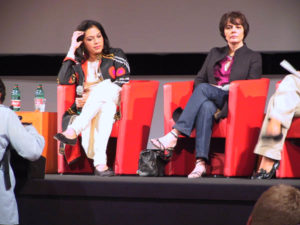
Mira Nair:
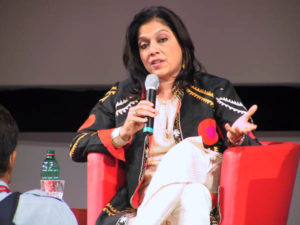
Tabu:
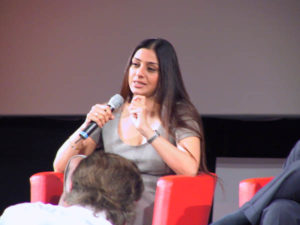
#######
Day 5: Tuesday October 17, 2006
As did the rest of Rome, attendants at Cinema Village this morning learned of the terrible news of the subway train collision during morning rush hour at Piazza Vittorio Emanuele II station in central Rome, killing a woman and injuring over 100 others. One train was stopped in the station when it was hit from behind by another traveling at high speed. The driver of the second train is believed to have run a red light. The press office issued a statement expressing its concern for the victims of this tragedy and that the festival is making plans to officially observe this event later in the week. While certain public events of the festival had to be rescheduled, most of the official meetings remained on the time schedule as planned.
The Stone Council
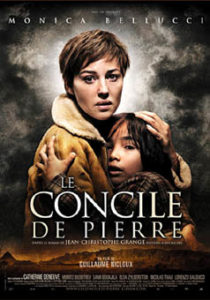 Monica Bellucci was back this morning with her second film that is being screened at the RomeFilmFest. From France, Le Concile de Pierre (The Stone Council) is a sci-fi/fantasy thriller where Bellucci plays a Russian embassy interpreter living in Paris with her adopted Asian son. At the age of seven, he is kidnapped by a sinister group of mysterious people and Bellucci finds that she will need to go to great lengths if she is to rescue him, even having to travel to Mongolia. Sometimes the supernatural story line became too much for me, but at least it moved along and kept my interest in wanting to know how it would end. Director Guillaume Nicloux pointed out that the novel contained more action than what was in the film. He said that he wanted to give more attention to the atmosphere and the interaction between the characters.
Monica Bellucci was back this morning with her second film that is being screened at the RomeFilmFest. From France, Le Concile de Pierre (The Stone Council) is a sci-fi/fantasy thriller where Bellucci plays a Russian embassy interpreter living in Paris with her adopted Asian son. At the age of seven, he is kidnapped by a sinister group of mysterious people and Bellucci finds that she will need to go to great lengths if she is to rescue him, even having to travel to Mongolia. Sometimes the supernatural story line became too much for me, but at least it moved along and kept my interest in wanting to know how it would end. Director Guillaume Nicloux pointed out that the novel contained more action than what was in the film. He said that he wanted to give more attention to the atmosphere and the interaction between the characters.
This role is quite a switch for the glamous Italian beauty. To play this character, Bellucci cut her hair short, minimal makeup, and played down her usual sex appeal. In contrast to her voluptuous character in the comedy N: Io e Napoleone, Bellucci takes on a more dramatic role displaying her not always seen acting talent. Bellucci said during the press meeting that she was interested in doing this film in order to get away from her usual glamorous roles. She said, “Nicloux really wanted me to look ordinary and less Mediterranean.” Nicloux said that he chose Bellucci for the role because she suited his imagination of what the character would look like. She also said that having to spend time away from her recently born daughter also helped her get in the moment of her character’s anguish. “We shot for three weeks in Mongolia and my daughter was still small, so it was very difficult for me to be far away from her. Perhaps this helped me tackle the role. I really didn’t feel well. I didn’t even manage to enjoy Mongolia, a wonderful place with beautiful landscapes and welcoming people.”
Starring opposite Bellucci in a surprising role as the evil antagonist is Catherine Deneuve. Nicloux said that he chose Deneuve for the villain because he wanted to see her in this role and he thought it would be interesting to see two beautiful women like Deneuve and Bellucci on screen together.
Toward the end of the meeting Bellucci was asked how she goes about choosing her roles. “I don’t have a particular strategy,” she explained. ‘I’ve been lucky. So far the opportunities have come to me.”
Photos from The Stone Council press meeting:
A festival translator, director Guillaume Nicloux, RomeFilmFest Premire Program Manager Piera Detassis, Monica Bellucci, and Lorenzo Balducci:
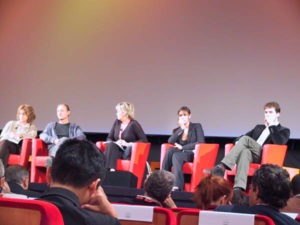
Monica Bellucci and Lorenzo Balducci:
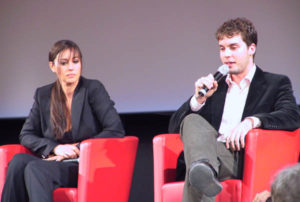
Monica Bellucci:
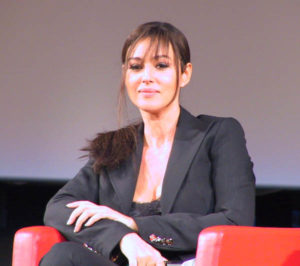
*****
The Prestige
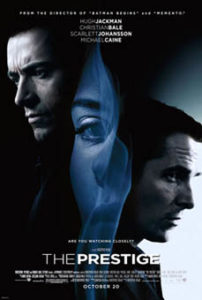 A few films are being screened this week without any delegation meeting with the press. The Prestige, based on Christopher Priest’s acclaimed novel, is one of those. The Prestige is a thriller about the rivalry between two Victorian-era magicians played by Hugh Jackman and Christian Bale. Their competition becomes a battle to uncover the other’s secrets. The film is directed by the capable hands of Christopher Nolan following his success with Batman Begins and Momento. Both Jackman and Bale give convincing performances as driven performers and artists. Michael Caine plays a key part as Jackman’s ingeneur, the behind-the-scenes technician who comes up with the ideas for executing new tricks. David Bowie makes his first screen appearance in several years as the only historic figure in the film, Nikola Tesla (1856-1943), the radical inventor, engineer, and scientist, who was a rival of Thomas Edison. Scarlett Johansson and Andy Serkis (Gollum from The Lord of the Rings) also star.
A few films are being screened this week without any delegation meeting with the press. The Prestige, based on Christopher Priest’s acclaimed novel, is one of those. The Prestige is a thriller about the rivalry between two Victorian-era magicians played by Hugh Jackman and Christian Bale. Their competition becomes a battle to uncover the other’s secrets. The film is directed by the capable hands of Christopher Nolan following his success with Batman Begins and Momento. Both Jackman and Bale give convincing performances as driven performers and artists. Michael Caine plays a key part as Jackman’s ingeneur, the behind-the-scenes technician who comes up with the ideas for executing new tricks. David Bowie makes his first screen appearance in several years as the only historic figure in the film, Nikola Tesla (1856-1943), the radical inventor, engineer, and scientist, who was a rival of Thomas Edison. Scarlett Johansson and Andy Serkis (Gollum from The Lord of the Rings) also star.
Nolan gives a fresh presentation of a Victorian-era film that centers more on the motivations of the celebrity magicians at the time and less on presenting a selection of magic tricks. I enjoyed the movie although I found one feature of the storyline that is meant to be a surprise, instead a bit predictable.
#####
Day 6: Wednesday October 18, 2006
La Sconosciuta (The Unknown Woman)
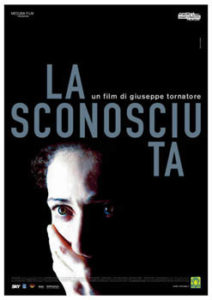 After much anticipation, Giuseppe Tornatore made his appearance at the RomeFilmFest to present his new film, La Sconosciuta (The Unknown Woman). This is his first movie since Malena with Monica Bellucci in 2000. After dedicating himself completely to the big project on the Lenigrad siege left behind by Sergio Leone after his death, La Sconosciuta marks a break from the overwhelming research work for the still-active project.
After much anticipation, Giuseppe Tornatore made his appearance at the RomeFilmFest to present his new film, La Sconosciuta (The Unknown Woman). This is his first movie since Malena with Monica Bellucci in 2000. After dedicating himself completely to the big project on the Lenigrad siege left behind by Sergio Leone after his death, La Sconosciuta marks a break from the overwhelming research work for the still-active project.
Ukrainian actress Ksenia Rappaport plays a mysterious woman looking for work as a maid in an unrecognizable Italian metropolitan city. As the story unfolds, we learn that some time ago she immigrated to Italy and had a traumatic situation working for a prostitution ring in southern Italy.
At first it appears she is just trying to get that period of her life behind her but then it becomes clear that her job search has a particular mission which is to get herself close to a family that lives in the building where she has a job as a cleaning woman. As she progresses with her mission, it seems that she cannot completely shake off her past. With the narrative style in the mystery format, Tornatore’s thriller has a Hitchcock feel. To help convey this mood, Ennio Morricone provided the musical score.
After the film Tornatore, Morricone, cast members, the producer Ciampaolo Letta met with the press. Festival President Goffredo Bettini sat on stage and thanked Tornatore for having decided to bring the film to Rome. Tornatore usually has avoided festivals, but RomeFilmFest organizers said the Sicilian filmmaker decided to bring La Sconosciuta to Rome in a show of support for the event.
Tornatore explained where he got the idea for this story. “The inspiration for this film came from a newspaper article I read years ago on a woman who was found forced by her husband to have children that were then sold. I started from here, but then it took other directions.”
The film takes on a harsher subject matter than in his earlier films. The comparisons with other directors of this genre were noted by several press members and asked Tornatore if he was influenced by these other directors in making his film. “I can’t say I was particularly thinking of Hitchcock or Tarentino,” said Tornatore. “But I can see the connections.”
Tornatore also explained that although the film dealt with complicated social issues, he was more concerned with telling a story and not making a political statement. “This film makes no social statements because I think that, today, ‘statement’ films have no reason to exist seeing as how information arrives everywhere.”
Tornatore acknowledged that it was his intent to make it difficult to identify the Italian city which turned out to be Trieste. He believed that Trieste was perfect to create a fictional city. “It is set in Trieste, but I tried to turn it into an imaginary city, to escape identification, just like with the actors. I thought Trieste was the ideal place.”
Morricone made a few remarks about writing the musical score for the film. He said that usually he is troubled by the relationship with directors in general. However he enjoys working with Tornatore. “In the editing room, I saw the film. I came up with two themes. I gave Tornatore the freedom to do what he wanted with some of the score. I had constant exchanges with Tornatore. I’m pleased with the result.”
This is his first movie since Malena with Monica Bellucci in 2000. After dedicating himself completely to the big project on the Lenigrad siege left behind by Sergio Leone after his death, La Sconosciuta marks a break from the overwhelming research work for the still-active project.
Photos of the La Sconosciuta press meeting:
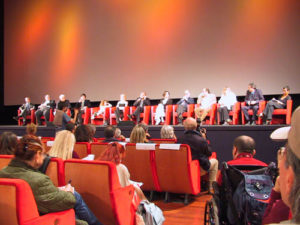
Claudia Gerini, director Giuseppe Tornatore, and Ksenia Rappoport:
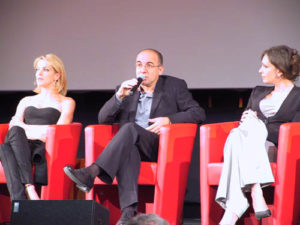
Giuseppe Tornatore, Ksenia Rappoport, Ennio Morricone, and Alessandra Haber:
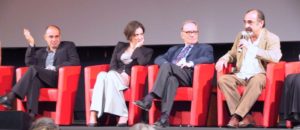
Pierfrancesco Favino, Clara Dossena, Claudia Gerini, Giuseppe Tornatore, and Ksenia Rappoport:
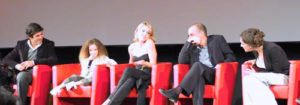
Ennio Morricone:
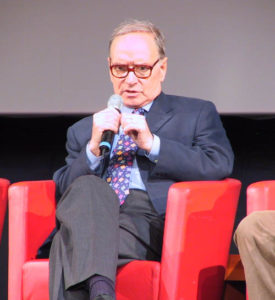
*****
In the evening, Ellen Burstyn, Lee Grant, and Martin Landau talked to an audience of 400 about the Actors Studio program and the craft of acting. The discussion began with showing segments a selected movie of each of the three: Alice Doesn’t Live Here Anymore (Burstyn), Dectective Story (Grant) and Ed Wood (Landau) and then the actors commented on those scenes. The discussion was moderated by Mario Sesti and Antonio Monda.
In discussing the Actors Studio program, they explained that its purpose is to help actors keep working even though they may not have a career enhancing job. Because most of the audience consisted of actors, the three accomplished stars gave advice on how to have a successful acting career. Burstyn stressed struggling actors not to give up on themselves. She told the audience not to let the commercial world dictate who they are as artists. Grant said it is important for young actors to be active and not passive about their careers. Landau encouraged young actors to be the best they can be and for an actor that is a twenty-four hour job.
The panel wanted the audience to know how well regarded Italian cinema is in the U.S., particularly to members of the Actors Studio. Grant said that Lee Strasberg, the founder of the Actors Studio, often spoke highly Italian stage actress Eleanora Duse. She also pointed out that in the U.S. Anna Magnani is considered a “living lesson” to American actors.
Photo from the Actors Studio Tribute:
Ellen Burstyn, Lee Grant, a film festival translator, and Martin Landau:
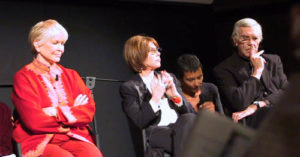
#####
Day 7: Thursday October 19, 2006
Marco Bellocchio, film festival director Mario Sesti, and Bernardo Bertolucci:
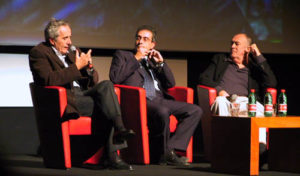
The big event for today was a screening of two short films by Italian movie masters Marco Bellocchio and Bernardo Bertolucci. While Bertolucci is probably more recognized internationally due to the international success of some of his films, particularly The Last Tango in Paris and The Last Emperor, Bellocchio nevertheless is one of the most respected directors in Italy with films such as Fists in the Pocket, Good Morning Night, and My Mother’s Smile. The name of Bellocchio’s film presented was Sorelle, a story about a young girl, her mother who lives away pursuing a career as an actress and her uncle. The uncle does not approve of his sister living away from his niece. Bertolucci’s film was Histoire d’Eaux which follows the trail of an Indian immigrant in Italy who comes across a mystical old man who asks the immigrant for some water. The immigrant sets off for the water and seems to enter a timeless world.
After the screenings, the directors took the stage to discuss their short films and the illustrious careers. Bertolucci said that the themes of the two films were 1) those who go and those who stay behind and 2) having to go back and think about one’s origins. Both directors praised each other’s films and began a discussion about their long friendship and aspects about their careers. They both made comparisons in their lives and careers. Both are from the same area of Italy. Bellocchio from Piacenza and Bertolucci from Parma. Early on, they remained interested in each other’s careers.
When asked what inspired them to make these films, Bertolucci said that he has been interested in water stories in Indian culture. Bellocchio said that he likes stories that deal with time and brother-sister relationships.
Bellocchio who conducts a workshop near Piacenza, answered a few questions on his approach to filmmaking. He said that he often finds a character for his films who is in tune with who he is at that point in his life. When asked what advice he could give to young filmmakers, he said that many years ago he asked Michelangelo Antonioni (L’Aventura, Blow Out) the same question. Bellocchio said that it is not helpful to ask a more accomplished director how to do it. A young director is better off learning how to do it on his own.
Bertolucci was asked what his reaction was to Rome having a film festival. He said, “I was doubtful at first, but here I am. I admire the people you’ve gotten on the board. You’ve won. Maybe some improvements are necessary, but ultimately all men can improve in life.”
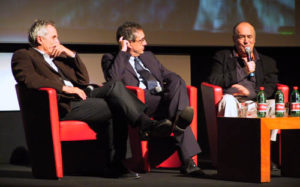
#####
Day 8: Friday October 20, 2006
Salvatore: This is Life
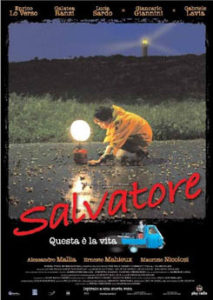 This morning was the premiere of Salvatore: Questa È La Vita starring Enrico Lo Verso. I liked this movie a lot. It was probably the film I enjoyed most throughout the whole week. As sentimental movies go, it hits its mark with an interesting story and the cast does a great job of winning the audience’s concern for their situations. The film takes place in Sicily where Lo Verso plays an elementary school teacher who transfers from Rome to take a teaching position in a small coastal Sicilian town. He soon learns about a boy who has not been coming to school, Salvatore.
This morning was the premiere of Salvatore: Questa È La Vita starring Enrico Lo Verso. I liked this movie a lot. It was probably the film I enjoyed most throughout the whole week. As sentimental movies go, it hits its mark with an interesting story and the cast does a great job of winning the audience’s concern for their situations. The film takes place in Sicily where Lo Verso plays an elementary school teacher who transfers from Rome to take a teaching position in a small coastal Sicilian town. He soon learns about a boy who has not been coming to school, Salvatore.
Salvatore has not been coming to school because he has been orphaned so he must support himself, his younger sister and their grandmother. Lo Verso sympathizes with the boy and tries to get the boy to return to school and help him with his situation. Legendary Italian actor Giancarlo Giannini plays a small but key role as the tough boss of a produce market.
After the film, the director Gian Paolo Cugno, Lo Verso and a few other cast members met with the press. I was surprised when I realized that I was the only American journalist in the room. I pointed this out to the panel. Cugno had already left the room, but Lo Verso and one of the producers said that the film would be distributed internationally including the U.S. It is scheduled to arrive in theaters in the U.S. sometime next year. This film has an enjoyable soundtrack.
Photos of the Salvatore: This Is Life press meeting:
Enrico Lo Verso:
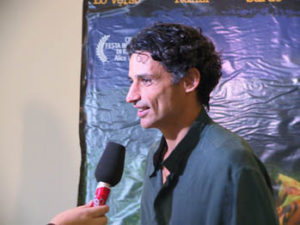
Giancarlo Giannini:
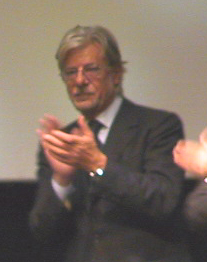
Enrico Lo Verso:
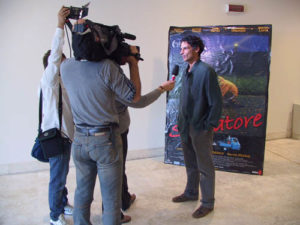
Enrico Lo Verso, Alessandro Mallia, director Gian Paolo Cugno, Concetta d’Amico, and Claudia Genarino:
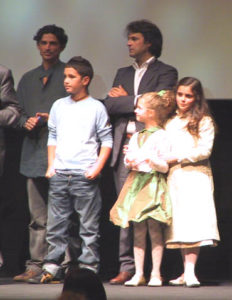
Alessandro Mallia, Claudi Genarino, and kid TV show host, and Concetta d’Amico:
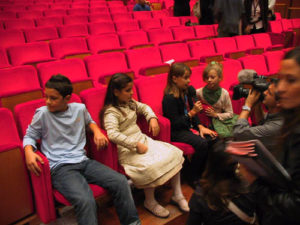
Maurizio Nicolosi, Enrico Lo Verso, director Gian Paolo Cugno, Lucia Sardo, and Ernesto Mahieux:
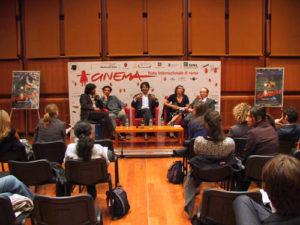
Enrico Lo Verso, director Gian Paolo Cugno, and Lucia Sardo:
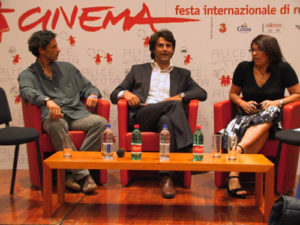
*****
Borat! Cultural Learnings of America for Make Benefit Glorious Nation of Kazakhstan
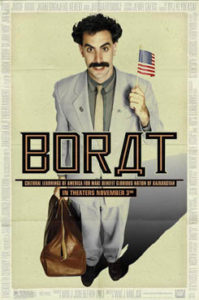 Jagshemash! British comedian Sacha Baron Cohen, known for his creation of his rapper alter-ego Ali G, is back with another personality, Kazakh journalist Borat Sagdiyev. I was surprised to find out that Larry Charles (Seinfeld, Curb Your Enthusiasm) directed the movie and Jay Roach (Austin Powers films) co-produced the movie with Cohen. The premise of this mocumentary is the comically clumsy journalist leaves his eastern European village and travels to the U.S in order to learn about American culture. Along the way, he gets himself into all sorts of situations with his staged awkwardness usually annoying others with his sometimes hilarious, sometimes over the top, outlandish remarks. It’s a clever creation. Some gags work and are very funny, others make you cringe particularly when Cohen is going for a laugh that’s not so funny and at some victims’ expense who genuinely believe he is a legitimate journalist. You can go to YouTube.com and find some more antics of his from the Ali G Show. Actually one of his best bits is Cohen’s interview as Ali G with Victoria (Posh Spice) David Beckham. Waa Waa Wee Waa!
Jagshemash! British comedian Sacha Baron Cohen, known for his creation of his rapper alter-ego Ali G, is back with another personality, Kazakh journalist Borat Sagdiyev. I was surprised to find out that Larry Charles (Seinfeld, Curb Your Enthusiasm) directed the movie and Jay Roach (Austin Powers films) co-produced the movie with Cohen. The premise of this mocumentary is the comically clumsy journalist leaves his eastern European village and travels to the U.S in order to learn about American culture. Along the way, he gets himself into all sorts of situations with his staged awkwardness usually annoying others with his sometimes hilarious, sometimes over the top, outlandish remarks. It’s a clever creation. Some gags work and are very funny, others make you cringe particularly when Cohen is going for a laugh that’s not so funny and at some victims’ expense who genuinely believe he is a legitimate journalist. You can go to YouTube.com and find some more antics of his from the Ali G Show. Actually one of his best bits is Cohen’s interview as Ali G with Victoria (Posh Spice) David Beckham. Waa Waa Wee Waa!
#####
Patricia McQueeney Award with Harrison Ford
The last event I went to for the day was a press meeting for the presentation of the first Patricia McQueeney Award that is intended to honor the work of agents and managers who often have important roles in their clients’ careers. The award honors the memory of Patricia McQueeney, one of the distinguished professionals in show business as well as Harrison Ford’s agent for over 30 years. She passed away last year. Each year the PMQ Award will go to an agent or manager who represents an actor or actress whose career choices are seen as being particularly interesting.
The award was chosen by the Honorary Committee composed of actor Harrison Ford, producer Sheryl Lansing, and RomeFilmFest General Director Giorgio Gosetti. The winner of the 2006 PMQ Award is Jim Berkus, co-founder and president of the UTA, United Talent Agency.
Jim Berkus was selected for the award due to his accomplishments at UTA, where he has represented some of the most important directors, scriptwriters, and actors of the world, such as Johnny Depp, Ben Stiller, Vincent Vaughn, Owen Wilson, Curtis Hanson, Joel and Ethan Coen, M. Night Shyamalan, Wes Anderson, Harold Ramis, and Charlie Kaufman. Harrison Ford himself is represented by UTA.
Harrison Ford attended the RomeFilmFest to present the award to Berkus. The two met with the press. Many of the press were glad to have the chance to ask questions to Ford with many of the questions more about his career than about the award or Berkus. Both were gracious and glad to answer all questions.
Berkus was asked about the importance of an agent or manager. “An agent is a representative and mediator. He’s not just someone who hunts for contracts. He or she has to discover artists and represent them internationally. A good agent is one who allows the actor to express his or her abilities and, above all, ambitions. An agent is a necessary part of a career. It is important to have advice from people who know the business and know people.”
Berkus was also asked what advice he would give to young actors. “You have to figure it out for yourself. You have to be very, very, very, very passionate about being an actor.”
Questions for Harrison Ford:
About attending the film festival: “I’m delighted to be here in Rome for the festival. I wish it all the success. I will continue to participate in the Rome Film Festival.”
His opinion about agents/managers: “Every actor has a unique relationship with his or her manager. Pat and I had such a close relationship that we could express all of our opinions freely. It was a constant give and take. Pat was a precise, meticulous, honest woman.”
How selection for this year’s recipient was decided: “The selection was by an ad hoc committee. Out of necessity, the selection for the recipient this year was subjective. The committee will expand in the future.”
His opinion on the inequality of available roles for actresses as they age. He said that he wasn’t sure if it was an issue of inequality. He said that the same applies to actors. “Audiences are becoming younger so older actors and actresses must be more vigorous in seeking roles. I’ve become more active.”
How he found working with Tommy Lee Jones on The Fugitive. He said that he enjoyed working with Jones. “He understands his craft and his purpose in the story. I believe an actor needs to be honest, keep things simple, and be direct. Tommy Lee is all three of those.”
What he looks for in choosing a film. “I make my decisions not on genre. I like telling stories. I look for the film that brings me something unexpected.”
Plans for a fourth Indiana Jones film that are apparently presently in development. “I’ll be back soon as Indiana Jones. We’re not finished with the script yet. We’re naturally taking the passage of time into account. I’m happy to work with Spielberg and Lucas again.” Recognizing that he is getting older, he still believes he is in the physical shape necessary to play the part. “I am fit to bring the audience the fun and excitement of the Indiana Jones adventure.” He was asked if Sean Connery would return in the role of Indiana’s father. “I would be delighted if Sean joined us.”
Another journalist asked Ford to comment on Connery’s remark at the RomeFilmFest that perhaps one reason the fourth film has not been made is because Ford is too old to play Connery’s son. Ford grinned and said, “That’s called payback because I said in his presence if we don’t do the movie soon, Sean will be too old to play my father. The truth is there is only a twelve-year age difference between us.”
Would he be interested in directing or performing on stage. “No interest in directing. It’s been 40 years since I was last onstage, I wouldn’t do it today. That truly is work. You have to wake up every day, go to the same place, work with the same people. That starts to look too much like a real job.”
One ridiculous question directed to Ford was who has been the most fascinating woman he has ever met. Amazed with the question, Ford calmly and wisely said, “Calista Flockhart.”
Photos of the PMQ Award with Harrison Ford press meeting:
Harrison Ford, 2006 PMQ Award recipient Jim Berkus, and RomeFilmFest official Teresa Cavina:
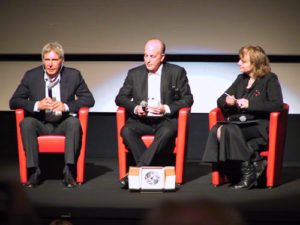
Harrison Ford:
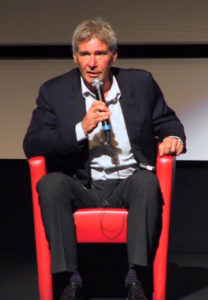
Jim Berkus:
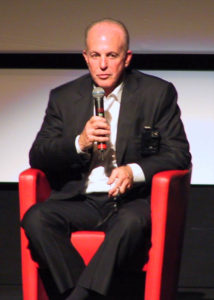
#####
Day 9: Saturday October 21, 2006
Today was the finale of the festival. It was a full day of events. The morning started off with a concert by the Accademia Nazionale di Santa Cecilia, conducted by Antonio Pappano, which performed classical pieces used by several master directors in their films, as well as pieces by Puccini and Berlioz. The concert was followed by the awards ceremony. Most of the awards were for the films that were in-competition section chosen by the Popular Jury, made up of 50 members and presided over by Ettore Scola.
Best Film Award: Playing the Victim by Kirill Serebrennikov
Best Actress Award: Ariane Ascaride in Le Voyage en Arménie by Robert Guédiguian
Best Actor Award: Giorgio Colangeli in L’Aria Salata by Alessandro Angelini
Special Jury Award: This is England by Shane Meadows
Other awards presented that were chosen by different juries were:
Best Documentary: Deep Water by Louise Osmond and Jerry Rothwell
Award for Best Italian Performer chosen from among the Italian films of all the festival sections: Ninetto Davoli in Uno Su Due by Eugenio Cappuccio
Award for the Première section: La Sconosciuta (The Unknown) by Giuseppe Tornatore
After the awards were presented, Rome’s mayor and festival officials met with the press to review festival statistics and express their delight that the festival went on so well. Of the statistics, one of the notable stats was that 169 films from 32 nations were shown.
Press meeting with the award winners for photos:
RomeFilmFest 2006 Award Ceremony:
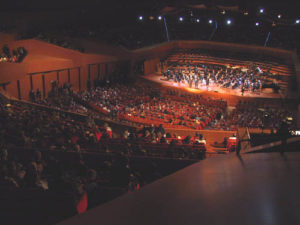
Mayor of Rome Walter Veltroni (3rd from right) with the RomeFilmFest officials:
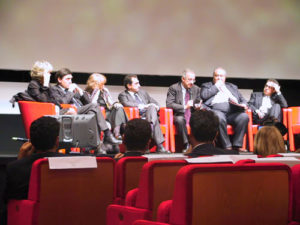
Award Winners: Festival officials, Shane Meadows, Kirill Serebrennikov, festival translator, Ninetto Davoli, Ariane Ascaride, Louise Osmond, and Giorgio Colangeli:
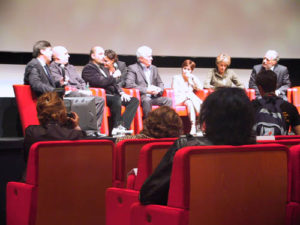
*****
Of all the celebrities who I saw attend the festival, none of them caused as much commotion as Robert De Niro when he arrived at the auditorium. There were more security guards controlling the crowds than I saw previously. I thought perhaps the prime minister was arriving, but it turned out that all this security was for De Niro. The actor came to the festival to show his support. He presented a preview of his new film and met with the press and public for a Q&A session. He came from meeting with Rome’s mayor Walter Veltroni who granted the actor an Italian passport. De Niro was accompanied by his wife and a delegation from the New York Tribeca Film Festival of which he is a co-founder and is the sister film festival to the RomeFilmFest.
Festival director Mario Sesti hosted the event. He showed scenes from Taxi Driver, Raging Bull, Analyze This, and a preview of De Niro’s new movie The Good Shepherd.
De Niro was asked about the famous “You talkin’ to me?” sequence from Taxi Driver. “I don’t remember much about it. I improvised some and some was scripted, but I don’t remember which. It’s uncomfortable to watch myself especially a scene like that.”
In regard to the myth of his perfectionism, asked De Niro was asked about the making of Raging Bull in which he won an Academy Award for his portrayal of middle weight legend Jake LaMotta. “It’s relevant whenever you do it. But you can’t always be that intense. Was there something special about the role that made him so intense? “Seeing someone collapse physically was interesting to see. The story itself was interesting. I used to see Jake in the clubs and saw what happened to him. He fell apart. I read the book while filming 1900 in Italy with Bertolucci. Then I called Martin Scorsese. The book had a lot of heart.”
De Niro spoke about the new film that he is directing, The Good Shepherd with an all-star cast featuring himself, Matt Damon and Angelina Jolie about the birth of the Central Intelligence Agency.
“A lot of research went into this film. Eric Roth wrote this screenplay eight or nine years ago. It was a long haul to get this type of movie done. A lot of characters to resolve.”
When asked if the movie has a contemporary relevance, a concept that many film critics drool over, De Niro responded, “I’m not sure of any contemporary relevance.” He seems to be more interested in the plot than any political message.
Advice to young actors. “You have to keep doing it because you love doing it.”
Advice for young directors. He advised that aspiring directors start directing at a young age. He referred to a conversation he had with director Elia Kazan during the filming of The Last Tycoon who was in his sixties at the time of that movie. “He said that it’s harder as you get older. The problems that come up for a director are relentless.”
Working again with Martin Scorsese. He said he would look forward to it. “I would like to work on a project with Marty and Eric Roth. Developing characters with Marty is most enjoyable. Sometimes we don’t know where the character is going but will end up somewhere interesting.”
Robert De Niro:
